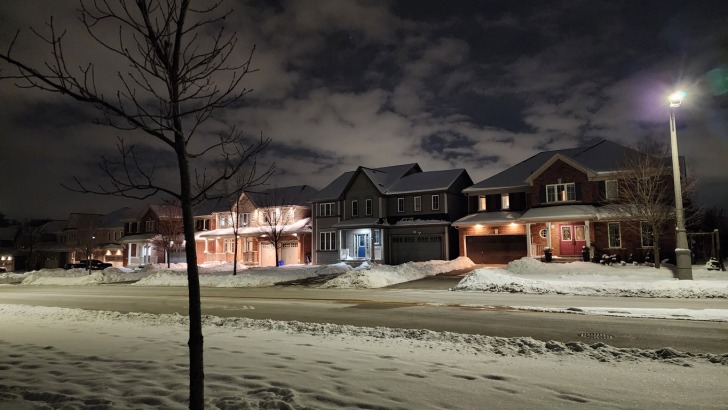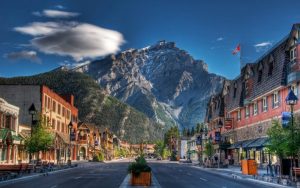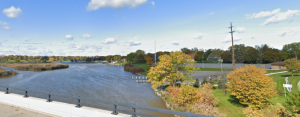 Canada : Safety by City
Canada : Safety by City
- Abbotsford
- Brampton
- Burnaby
- Calgary
- Coquitlam
- Edmonton
- Halifax
- Hamilton
- Kelowna
- Kitchener
- Mississauga
- Montreal
- Nanaimo
- Niagara Falls
- Oshawa
- Ottawa
- Quebec City
- Red Deer
- Regina
- Saskatoon
- Thunder Bay
- Toronto
- Vancouver
- Victoria
- Windsor
- Winnipeg
Located in Ontario, Canada, on the scenic Lake Ontario shoreline, Oshawa boasts a population of 175,000 and is only 37 miles east of Downtown Toronto, making it a large commuter community.
Oshawa comes from the Ojibwa term “aazhawe,” or “the crossing place.”
The city has a crime index of 59.8, making it the sixth most dangerous city in Canada and 84th globally.
Municipalities with crime rates falling between 40 and 60 are considered to have moderate crime rates, and those with indexes between 60 and 80 have high crime rates.
Oshawa is considered one of Canada’s most vibrant cities and has a moderate crime rate due to high vandalism and petty theft levels, most of which are due to drug use.
Violent crime in Oshawa is low, so the city focuses on improving property crime in certain areas.
If you’re considering traveling or relocating to Oshawa, it’s important to understand the danger levels and have other useful information to ensure your visit is safe and fruitful.
Keep reading to learn more!
Warnings & Dangers in Oshawa

OVERALL RISK: MEDIUM
Oshawa is rated the sixth most dangerous city in Canada. However, danger can come on many levels, including property damage, of which vandalism and other petty crimes rule the court system. Given the drug issues that are sweeping through North America, including Oshawa, there are some related crimes, so it's important not to carry valuables and venture down dark streets at night.

TRANSPORT & TAXIS RISK: LOW
Mass transit and taxis are safe in Oshawa, but it's always smart to be vigilant in crowded vehicles and stations with your pockets and wallet. Taxis and ride-shares are highly reliable, so using them when returning to your accommodation late at night is recommended since bus options are limited.

PICKPOCKETS RISK: MEDIUM
Part of Oshawa's petty theft plagues is pickpocketing, especially in crowded places. In addition to being a major inconvenience on your vacation, you can lose highly personal and valuable items. When traveling to any destination, it's not advisable to bring expensive items and leave even the least costly item unattended, like a backpack. While locals are friendly, stay focused while conversing and leaving your bag alone on a park bench.

NATURAL DISASTERS RISK: MEDIUM
Given that Oshawa is in northern North America, the area is subjected to severe weather like hail, lightning, tornadoes, floods, heavy rains, and heavy winds during the spring and summer. Ontario is known for intense winter storms, ice, heavy snowfall, and freezing rain in winter. These storms are exacerbated by Oshawa's lakeside location, which produces lake-effect snow. Therefore, review the weather conditions before traveling and ensure you are prepared.

MUGGING RISK: LOW
Violent crimes don't occur in Oshawa often but can happen due to drug issues. When the situation arises, give the criminals what they are requesting and contact the police as soon as they are gone. Since Oshawa is a smaller city, the police will respond quickly, especially since this situation doesn't occur often.

TERRORISM RISK: LOW
Due to Canada's largest city, Toronto, the terrorism warning is typically Medium, which means an incident could occur. However, there are no recent reported terrorism cases in Oshawa since it's in the suburbs and not a major population center. However, it's important always to be alert for terrorism and keep updated with the local news, but don't let it ruin your trip.

SCAMS RISK: LOW
Petty fraud in Oshawa is rare, but those from poorer areas tend to attempt to trick tourists more than locals. This fraud type will be harmless and is more of an inconvenience or uncomfortable situation than anything, but it never becomes violent. For instance, a local attempting to deceive a visitor may hint at receiving money for giving them directions. Tipping locals for providing potentially accurate directions is not necessary.

WOMEN TRAVELERS RISK: MEDIUM
There's an average risk for women travelers to Oshawa, you should not walk alone at night as a woman.

TAP WATER RISK: LOW
Canada boasts nine percent of the world's freshwater resources, with just 0.5 percent of the population. This means citizens and visitors have access to high-quality and clean water. While most Canadian residents have clean water access, First Nation communities are typically left behind, such as the Neskantanga First Nation, where residents must boil water. In Oshawa, all residents have access to clean, high-quality water due to its location on the lake, so it's a low risk to drink it while visiting.
Safest Places to Visit in Oshawa
Travelers visiting Oshawa are advised to stick to the northern part of the city.
These areas include the Oshawa Golf Course and Oshawa Creek.
While exceptions exist to this rule, Oshawa continues improving physical and property safety as more individuals move to this bedroom community.
The city used to be a small town for blue-collar auto workers, but since the auto industry has almost dried up in the area, new residents who commute to Toronto have moved in.
This has generated more taxes, which has increased police presence.
Places to Avoid in Oshawa
The areas south of 401 and Adelaide Street should be avoided, as that’s where most crime occurs.
To reiterate previous points, Oshawa is a safe place to visit and live.
Still, the southern areas have lower incomes, so there are more associated crimes, including vandalism and other petty acts.
If you want to purchase a home in the area, consider buying in the northern suburbs above 401.
Safety Tips for Traveling to Oshawa
- Avoid Demonstrations. Although Oshawa is a small city compared to nearby Toronto, if demonstrations or protests occur, always follow the local authorities’ instructions on how to avoid them. Occasionally, protests become violent, so it’s not worth getting involved.
- Don’t Wander Down Dark Alleys at Night. Avoid poorly lit areas of Oshawa, as most crimes occur at night and in the dark. Although Canada is safe, poorly lit areas allow criminals to commit crimes.
- Don’t Approach Wildlife. While observing wildlife in the wilderness is perfectly acceptable, don’t attempt to feed or pet them. Observe nature from a distance so you don’t get attacked.
- Register With Ranges When Hiking. The vast and beautiful Canadian wilderness isn’t far from Oshawa, and hikers and campers often get lost and go missing. Therefore, if you’re planning even just a day trip to go hiking, it’s crucial to register with the local ranger office, letting them know your route and estimated times.
- Consider Road Conditions. Canada’s road conditions vary drastically throughout the year, especially during the winter. Ice and snow test locals’ driving skills and bad weather can close significant roads and highways. Therefore, if you plan to take a longer trip out of Oshawa, check the routes and conditions along the way.
- Prepare for Cold Exposure. As part of the natural disaster preparation trip, dressing appropriately for the winter is necessary. Cold exposure can be a significant issue for travelers unfamiliar with sub-zero temperatures. Hypothermia isn’t reserved for hikers and skiers, as it can occur during daily activities.
- Take Care of Your Possessions. Take care of your belongings in a bigger city like Toronto or a smaller location like Oshawa. Thieves scout cars, hotels, and AirBNBs, searching for visible valuables before committing the crime. This is a common occurrence in touristy areas. Police have been known to fine visitors for leaving their cars unlocked in certain areas.
- Avoid Drinking and Driving. While this is good advice for any location in the world, drunk driving can get you deported without re-entry into Canada in the future. Officials consider drunk driving a criminal offense, which can result in deportation.
- Health Insurance. Check with your healthcare provider to determine if you have coverage when visiting Canada, which has one of the top healthcare systems in the world for residents. Unfortunately, the government-funded system doesn’t cover tourists, so buying insurance or using your existing plan is important.
- Prepare for Natural Disasters. Although Oshawa is not on the ocean, the remnants of hurricanes occasionally go through the area, bringing heavy rain, flooding, and strong winds. Tornadoes, severe snowstorms, hail, and other inclement weather are common, so it’s best to be prepared for all situations.
So... How Safe Is Oshawa Really?
Although Oshawa has received the designation of being the sixth most dangerous city in Canada, most crimes are petty property damage, which only harms the wallet, not human life.
Canada is consistently ranked as one of the safest countries worldwide, so even though it is the most dangerous city; it pales compared to the neighboring United States and other cities in the Western Hemisphere.
The biggest issue in the city is drug-related, but users don’t typically target tourists as situations occur behind closed doors.
Oshawa is low in most categories, except pickpockets, natural disasters, and the overall crime risk.
Areas outside of Oshawa are much more remote and perfectly safe at night, but just be aware of nocturnal animals running into the road and the lack of lighting.
Some areas of Oshawa are lower on the poverty line than others, with localized crime, so it’s best to avoid them at night.
Travelers should not be afraid to visit Oshawa as most crimes are minor skirmishes and property damage within the community.
For example, when traveling anywhere, visitors are urged to use their best judgment, and if something doesn’t feel right, they should walk away.
Also, keeping expensive belongings safe at home or in the hotel and not flashing them publicly is always advisable, as this asks for unwanted attention.
Additionally, take well-lit and central streets when wandering around at night and avoid drunken showdowns and other skirmishes if you come across them.
Otherwise, you will have a great time in a vibrant and growing city.
How Does Oshawa Compare?
| City | Safety Index |
|---|---|
| Oshawa | 42 |
| Kitchener | 75 |
| Ottawa | 83 |
| Quebec City | 85 |
| Vancouver | 82 |
| Halifax | 79 |
| Thunder Bay | 65 |
| Deadwood (United States) | 80 |
| Sturgis (United States) | 80 |
| Pierre (United States) | 81 |
| Spearfish (United States) | 80 |
| Hill City (United States) | 83 |
| Temuco (Chile) | 31 |
Useful Information

Visas
For less than 180 days, tourists in Canada are not required to have a visa, but certain nationalities must apply. All information from your local state department is updated, so it's best to check before booking. A valid passport is required, even when traveling from the United States. Previously, U.S. citizens could cross the Canadian border with their driver's license, but those rules changed several years ago to require a passport.

Currency
The official currency is the Canadian dollar, which is returned to as a "Loonie," the two Canadian dollar coins are called a "Toonie." The Canadian dollar utilizes the same symbol as the United States dollar: %, with CAD code. One Canadian dollar equals 100 cents. Although some places accept U.S. dollars, visiting an ATM and withdrawing the local currency is best. Also, most shops, restaurants, and bars accept credit cards.

Weather
The ideal time to visit Oshawa is June and October because average temperatures vary drastically between summer and winter, so traveling to the city in milder seasons is best. Half the year, the weather feels freezing, with lows dipping below zero, and in the other half, there's a good chance of inclement weather. June and October are dry and warm, with a low probability of severe weather. Also, October is considered a low travel season, so hotel and restaurant prices are lower.

Airports
The closest airports are Lester B. Pearson International Airport, just outside Toronto, and the Billy Bishop Toronto City Center Airport.

Travel Insurance
Although it's not required, having a travel insurance policy when visiting Oshawa is highly recommended in case you are injured, have last-minute cancelations, or your bags are delayed or missing. For a little extra money, the insurance protects you and your belongings.
Oshawa Weather Averages (Temperatures)
Average High/Low Temperature
| Temperature / Month | Jan | Feb | Mar | Apr | May | Jun | Jul | Aug | Sep | Oct | Nov | Dec |
|---|---|---|---|---|---|---|---|---|---|---|---|---|
| High °C |
-4 | -4 | 2 | 9 | 17 | 22 | 26 | 25 | 20 | 13 | 5 | -3 |
| Low °C |
-14 | -14 | -9 | -2 | 6 | 12 | 14 | 14 | 10 | 4 | -3 | -10 |
| High °F |
25 | 25 | 36 | 48 | 63 | 72 | 79 | 77 | 68 | 55 | 41 | 27 |
| Low °F |
7 | 7 | 16 | 28 | 43 | 54 | 57 | 57 | 50 | 39 | 27 | 14 |
Canada - Safety by City
| City | Safety Index |
|---|---|
| Abbotsford | 83 |
| Brampton | 82 |
| Burnaby | 65 |
| Calgary | 82 |
| Coquitlam | 86 |
| Edmonton | 86 |
| Halifax | 79 |
| Hamilton | 76 |
| Kelowna | 76 |
| Kitchener | 75 |
| Mississauga | 85 |
| Montreal | 81 |
| Nanaimo | 32 |
| Niagara Falls | 87 |
| Oshawa | 42 |
| Ottawa | 83 |
| Quebec City | 85 |
| Red Deer | 32 |
| Regina | 74 |
| Saskatoon | 73 |
| Thunder Bay | 65 |
| Toronto | 81 |
| Vancouver | 82 |
| Victoria | 82 |
| Windsor | 81 |
| Winnipeg | 77 |











